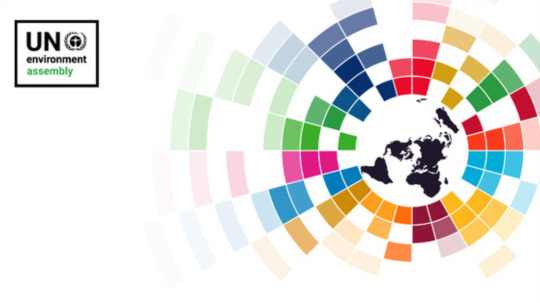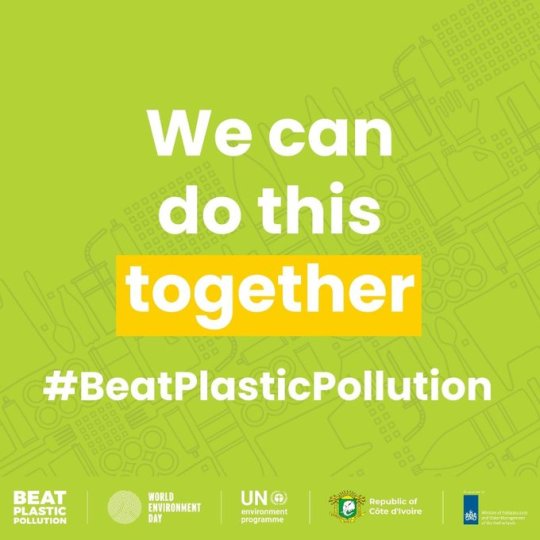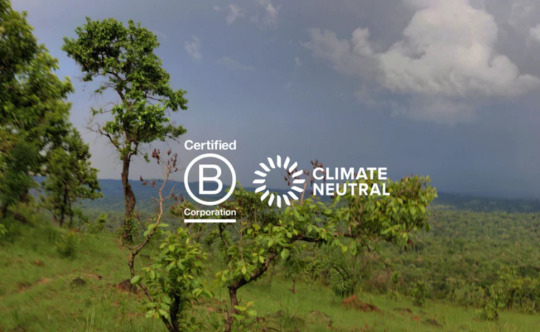Text
Closing Plenary meeting of the sixth session of the Environment Assembly.
At the closing plenary meeting, on the 1 March 2024, the Environment Assembly will: - consider the credentials of the representatives in attendance on the basis of a report from the Bureau of the Assembly - consider the report of the committee of the whole - take action on a draft ministerial declaration and draft resolutions and decisions, including on the provisional agenda and dates of the next session - elect the UNEA-7 Bureau - adopt the draft report of the proceedings of UNEA-6, which is to be finalized after the session by the Rapporteur.
Watch the Closing Plenary - Sixth Session of the UN Environment Assembly

#natural environment#environmentalists#environment#environmental damage#un environment programme#unea6#closing session#UN Environment assembly#multilateral environmental agreements#environmental multilateralism#tackle nature loss#tackle climate change#tackle pollution
0 notes
Text
Closing Press Conference - Sixth Session of the UN Environment Assembly.
30-45 minute press conference with the UNEP Executive Director, UNEA President and others with accredited international media (TBC) to brief media on outcomes of UNEA-6.
Watch the Closing Press Conference - Sixth Session of the UN Environment Assembly!
#UNEP Executive Director#stakeholders#media briefing#unea6#environmentalists#multilateral environmental agreements#environmental multilateralism
0 notes
Text
Global Resource Outlook launch - Sixth Session of the UN Environment Assembly.
Press event for the launch of the Global Resources Outlook 2024 at the 6th United Nations Environment Programme Assembly (UNEA-6).
Watch the Global Resource Outlook launch - Sixth Session of the UN Environment Assembly,
#Global Resources Outlook#environment#plenary sessions#natural environment#environmentalists#unea6#environmental multilateralism#un environment programme#un environment assembly
0 notes
Text
Leadership Dialogue Three - Sixth Session of the UN Environment Assembly.
Alive and kicking: Environmental multilateralism is a beacon of hope but is it delivering fast enough?
Watch the Leadership Dialogue Three - Sixth Session of the UN Environment Assembly
#natural environment#environment#plenary sessions#environmentalists#unea6#Environmental multilateralism#un environment programme#UN Environment assembly
0 notes
Text
Leadership Dialogue Two - Sixth Session of the UN Environment Assembly.
Show me the money: Can the global financial system really tackle climate change, nature loss and pollution?
Watch the Leadership Dialogue Two - Sixth Session of the UN Environment Assembly!
#financial system#tackle climate change#tackle nature loss#tackle pollution#leadership dialogue#environmental leadership#unae6#un environment programme#un environment assembly
0 notes
Text
Leadership Dialogue One - Sixth Session of the UN Environment Assembly.
Super-highway or still in slow-motion: Are science, data and digitalization really speeding our transition to a sustainable future?
Watch the Leadership Dialogue One - Sixth Session of the UN Environment Assembly
#environmental leadership#leadership dialogue#digitalisation#unea6#un environment programme#UN Environment assembly
0 notes
Text
Press Briefing by the President of the General Assembly of the United Nations on Climate Change - Sixth Session of the UN Environment Assembly.
The President of the General Assembly of the United Nations, speaking to the press on climate and human rights at the UNEA-6 conference.
Watch the Press Briefing: Dennis Francis (PGA) on Climate Change - Sixth Session of the UN Environment Assembly
0 notes
Text
Inclusive Multilateralism Fit for Timely and at Scale Delivery on Climate, Biodiversity Loss and Pollution – the Central Role of Major Groups and Stakeholders.
Statements may be delivered by representatives of Member States speaking on behalf of a group of States or speaking in their national capacity, and time permitting, by members of the specialized agencies, the specialized agencies, the United Nations bodies, accredited intergovernmental organizations and the regional economic integration organizations as well as accredited non-governmental organizations and the major groups and stakeholders.
Watch the High-Level Segment & National Statements - Sixth Session of the UN Environment Assembly!
#UN Environment Assembly#environment#natural environment#environmentalists#plenary sessions#environmental damage#unea6#stakeholders#multilateral environmental agreements#multi-stakeholders#biodoversity#biodiversity loss#climate change
0 notes
Text
Multi-stakeholder Dialogue - Sixth Session of the UN Environment Assembly.
The theme of the Multi-stakeholder dialogue at UNEA-6 is "Inclusive Multilateralism Fit for Timely and at Scale Delivery on Climate, Biodiversity Loss and Pollution – the Central Role of Major Groups and Stakeholders".
Watch the Multi-stakeholder Dialogue - Sixth Session of the UN Environment Assembly.
#environment#natural environment#environmentalists#plenary sessions#unea6#Biodiversity Loss#environmental pollution#major groups#stakeholders#Inclusive Multilateralism#Multi-stakeholder dialogue#environmental damage
0 notes
Text
National Statements - Sixth Session of the UN Environment Assembly
Statements may be delivered by representatives of Member States speaking on behalf of a group of States or speaking in their national capacity, and time permitting, by members of the specialized agencies, the specialized agencies, the United Nations bodies, accredited intergovernmental organizations and the regional economic integration organizations as well as accredited non-governmental organizations and the major groups and stakeholders.
Watch the National Statements - Sixth Session of the UN Environment Assembly!
Read the National statement!

#UNEA6#environment#Natural environment#environmentalists#natural environment#plenary sessions#intergovernmental organizations#regional economic integration organizations#major groups#stakeholders#environmental damage#non-governmental organizations#specialized agencies
0 notes
Text
High-level segment opening plenary and National Statements.
Watch the High-Level Segment & National Statements - Sixth Session of the UN Environment Assembly.
#UN Environment Assembly#environment#plenary sessions#environmentalists#environmental damage#natural environment#unea6#highleveldialogue
0 notes
Text
Opening of the Multilateral Environmental Agreements day - Sixth Session of the UN Environment Assembly.
Watch the Opening of the Multilateral Environmental Agreements day - Sixth Session of the UN Environment Assembly!
Multilateral environmental agreement - Sixth session of the United Nations Environment Assembly (UNEA-6) . UN Web TV - UN Environment Programme
UEF - UNEP Course on Multilateral Environmental Agreements
#UNEA6#EnvironmentalDamage#environment#environmental ressources#environmental issues#high level dialogue#meas#Multilateral Environmental Agreements#environmental multilateralism
0 notes
Text
Strengthening cooperation between UNEA, UNEP and MEAs to enhance effective implementation at the national level including through means of implementation.
Watch the MEAs High-level Dialogue Two - Sixth Session of the UN Environment Assembly

#environment#unea6#unep#MEAs#plenary sessions#natural environment#environmentalists#environmental damage
0 notes
Text
Orchestrating Global Synergies for Climate Action and SDGs - Uniting Hands, Voices, and Visions (SDG Action Weekend, Side Event)
Through a series of success stories, the event intends to inspire policymakers and stakeholders to adopt integrated strategies that amplify climate and SDG outcomes, informed by the newly launched First Global Report on Climate and SDG Synergy.
Side Event at the SDG Action Weekend organized by UNFCCC and UNDESA.
To maximize the SDG Summit's impact, the Secretary General is convening an SDG Action Weekend, which will generate opportunities for stakeholders, United Nations entities, and Member States to convene inside the United Nations Headquarters and set out specific commitments and contributions to drive SDG transformation between now and 2030.
The SDG Action Weekend will consist of the SDG Mobilization Day on Saturday, 16 September, and the SDG Acceleration Day on Sunday, 17 September at UNHQ in New York.
The SDG Action Weekend includes a select number of high-level side-events identified through an open call that concluded in August. They are jointly organized by coalitions of Member States, UN agencies and other international organizations, and global stakeholder networks.
#climate action#climate change#SDG action#stakeholders#United Nations entities#plenary sessions#global goals#sdg13#sustainable development goals
0 notes
Text
Beat Plastic Pollution; We can do this together.

Ending plastic pollution will bring a massive payoff for people and the planet. This World Environment Day, show appreciation for those working towards solutions to Beat Plastic Pollution and call out those who need to do better. Find out how to get involved
#BeatPlasticPollution#united nations environment programme#water pollution#world environment day#get involved
0 notes
Text
‘Toxic tidal wave’ of plastic pollution putting human rights at risk.
The appeal comes as countries continue negotiations towards an international treaty on plastic pollution, and ahead of World Environment Day on 5 June.
“Plastic production has increased exponentially over recent decades and today the world is generating 400 million tonnes of plastic waste yearly,” said David R. Boyd, UN Special Rapporteur on human rights and the environment, and Marcos Orellana, Special Rapporteur on toxics and human rights.
“We are in the middle of an overwhelming toxic tidal wave as plastic pollutes our environment and negatively impacts human rights in a myriad of ways over its life cycle.”
A dangerous ‘cycle’
The experts outlined how all stages of the “plastics cycle” are harmful to people’s rights to a healthy environment, life, health, food, water and an adequate standard of living.
Plastic production releases hazardous substances and almost exclusively relies on fossil fuels, and plastic itself contains toxic chemicals which put humans and nature at risk. Furthermore, 85 per cent of single use plastics end up in landfills or dumped in the environment.
Meanwhile, incineration, recycling and other “false and misleading solutions” only aggravate the threat, they added, noting that “plastic, microplastic and the hazardous substances they contain can be found in the food we eat, the water we drink and the air we breathe.”
Suffering in ‘sacrifice zones’
The statement also addressed how marginalized communities are most affected by exposure to plastic-related pollution and waste.
“We are particularly concerned about groups suffering from environmental injustices due to heightened exposure to plastic pollution, many of them living in 'sacrifice zones'”, they said, referring to locations near facilities such as open-pit mines, petroleum refineries, steel plants and coal-fired power stations.
Plastic pollution has also made an “alarming” contribution to climate change, which is often overlooked, according to the experts. “For instance, plastic particles found in oceans limit the ability of marine ecosystems to remove greenhouse gases from the atmosphere,” they said.
As Special Rapporteurs, Mr. Boyd and Mr. Orellana receive their mandates from the UN Human Rights Council. They are not UN staff and are not paid for their work.
They noted that over the past two years, the Council and the UN General Assembly have adopted landmark resolutions recognising the human right to a clean, healthy and sustainable environment, which should prompt and guide initiatives to address plastic pollution.

© UNDP/Sumaya Agha
A woman sorts plastic at a recycling plant in Jordan.
Treaty negotiations underway
They also welcomed progress towards an internationally binding treaty to turn the tide on plastic pollution, including in the marine environment. The UN Environment Programme (UNEP) projects that the amount of plastic waste entering aquatic ecosystems could reach some 23 to 37 million tonnes per year by 2040.
Negotiations continued this week in Paris, following on from an initial session held last year in Uruguay.
Speaking during the opening on Monday, UNEP chief Inger Andersen bluntly stated that “we cannot recycle our way out of this mess”, adding that “only elimination, reduction, a full life-cycle approach, transparency and a just transition can bring success.”
The second meeting of the Intergovernmental Negotiating Committee on Plastic Pollution (INC-2) will conclude on Friday, and delegates have a deadline to agree a treaty by 2024.
#single use plastic#plastic pollution#plastic waste#united nations environment programme#Intergovernmental Negotiating Committee on Plastic Pollution (INC-2)
2 notes
·
View notes
Text
FIVE WAYS WE CAN CUT OUR DEPENDENCE ON PLASTIC.

Our responsibility to positivly impact people and planet through our products, programs, and actions. .
0 notes